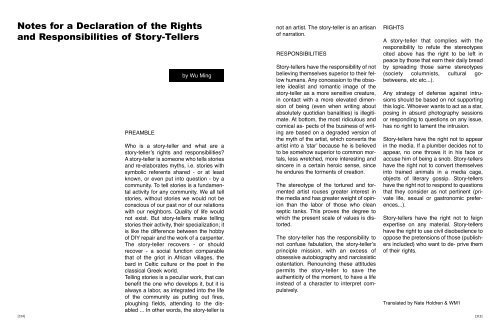PAVILION
PAVILION
PAVILION
- No tags were found...
Create successful ePaper yourself
Turn your PDF publications into a flip-book with our unique Google optimized e-Paper software.
Notes for a Declaration of the Rights<br />
and Responsibilities of Story-Tellers<br />
[314]<br />
PREAMBLE<br />
by Wu Ming<br />
Who is a story-teller and what are a<br />
story-teller’s rights and responsibilities?<br />
A story-teller is someone who tells stories<br />
and re-elaborates myths, i.e. stories with<br />
symbolic referents shared - or at least<br />
known, or even put into question - by a<br />
community. To tell stories is a fundamental<br />
activity for any community. We all tell<br />
stories, without stories we would not be<br />
conscious of our past nor of our relations<br />
with our neighbors. Quality of life would<br />
not exist. But story-tellers make telling<br />
stories their activity, their specialization; it<br />
is like the difference between the hobby<br />
of DIY repair and the work of a carpenter.<br />
The story-teller recovers - or should<br />
recover - a social function comparable<br />
that of the griot in African villages, the<br />
bard in Celtic culture or the poet in the<br />
classical Greek world.<br />
Telling stories is a peculiar work, that can<br />
benefit the one who develops it, but it is<br />
always a labor, as integrated into the life<br />
of the community as putting out fires,<br />
ploughing fields, attending to the disabled<br />
... In other words, the story-teller is<br />
not an artist. The story-teller is an artisan<br />
of narration.<br />
RESPONSIBILITIES<br />
Story-tellers have the responsibility of not<br />
believing themselves superior to their fellow<br />
humans. Any concession to the obsolete<br />
idealist and romantic image of the<br />
story-teller as a more sensitive creature,<br />
in contact with a more elevated dimension<br />
of being (even when writing about<br />
absolutely quotidian banalities) is illegitimate.<br />
At bottom, the most ridiculous and<br />
comical as- pects of the business of writing<br />
are based on a degraded version of<br />
the myth of the artist, which converts the<br />
artist into a ’star’ because he is believed<br />
to be somehow superior to common mortals,<br />
less wretched, more interesting and<br />
sincere in a certain heroic sense, since<br />
he endures the torments of creation.<br />
The stereotype of the tortured and tormented<br />
artist rouses greater interest in<br />
the media and has greater weight of opinion<br />
than the labor of those who clean<br />
septic tanks. This proves the degree to<br />
which the present scale of values is distorted.<br />
The story-teller has the responsibility to<br />
not confuse fabulation, the story-teller’s<br />
principle mission, with an excess of<br />
obsessive autobiography and narcissistic<br />
ostentation. Renouncing these attitudes<br />
permits the story-teller to save the<br />
authenticity of the moment, to have a life<br />
instead of a character to interpret compulsively.<br />
RIGHTS<br />
A story-teller that complies with the<br />
responsibility to refute the stereotypes<br />
cited above has the right to be left in<br />
peace by those that earn their daily bread<br />
by spreading those same stereotypes<br />
(society columnists, cultural gobetweens,<br />
etc etc...).<br />
Any strategy of defense against intrusions<br />
should be based on not supporting<br />
this logic. Whoever wants to act as a star,<br />
posing in absurd photography sessions<br />
or responding to questions on any issue,<br />
has no right to lament the intrusion.<br />
Story-tellers have the right not to appear<br />
in the media. If a plumber decides not to<br />
appear, no one throws it in his face or<br />
accuse him of being a snob. Story-tellers<br />
have the right not to convert themselves<br />
into trained animals in a media cage,<br />
objects of literary gossip. Story-tellers<br />
have the right not to respond to questions<br />
that they consider as not pertinent (private<br />
life, sexual or gastronomic preferences...).<br />
Story-tellers have the right not to feign<br />
expertise on any material. Story-tellers<br />
have the right to use civil disobedience to<br />
oppose the pretensions of those (publishers<br />
included) who want to de- prive them<br />
of their rights.<br />
Translated by Nate Holdren & WM1<br />
[315]








